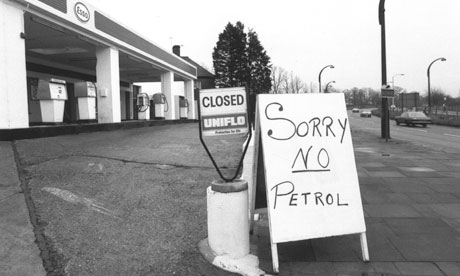UK facing 1970s-style oil shock which could cost economy £45bn – Huhne
Climate and energy secretary warns oil price of $100 a barrel transforms the economics of climate change
- guardian.co.uk,
- Article history

A sign reading 'Sorry No Petrol' outside a service station during a petrol shortage on February 1978. Photograph: Pete Primarello/Getty Images
Britain is facing a 1970s-style oil price shock that could cost the UK economy £45bn over two years, the climate and energy secretary, Chris Huhne, is expected to warn in his first intervention on the issue since the start of Middle East political crisis.
In Thursday's keynote speech on the impact of the oil crisis, Huhne will argue that an $100 (£61) a barrel price for oil transforms the economics of climate change in Britain.
He will disclose the Department of Energy and Climate Change's (Decc) economists have warned that if the oil price rise turns into a 1970s-style shock the cumulative loss to the UK economy would be worth £45bn over two years. Decc's economists made the calculation on the basis of oil prices rising from $80 a barrel last year to $160, according to Huhne.
At $102 a barrel, oil is at a two-and-a-half year high and there have been predictions that if the political turmoil spreads across the Gulf, the price will rise considerably more.
Huhne will say: "If the oil price doubled, as from $80 last year to $160 this year, it could lead to a cumulative loss of GDP of around £45bn over two years. This is not just far-off speculation: it is a threat here and now."
The speech is an attempt to galvanise public support for tough measures to create a green economy, after recent setbacks including attacks on the science of climate change and stalled international negotiations. .
The speech could also be seen as an attempt to burnish the coalition's green credentials after months in which the Department for Transporthas declared an end to the war on the motorist.
Drawing on research conducted for the previous government by Lord Stern, Huhne will argue that a $100 a barrel price is the exact point at which the economics of climate change pivot so that it becomes cheaper for British consumers and businesses to invest in green technology than remain with the status quo.
He will say that if oil only reaches $108 a barrel by 2020 as predicted by the US Department of Energy, which would also lead to higher gas prices, then "the UK consumer will win hands down". He will say the UK consumer would be "paying less through low-carbon policies than they would pay for fossil fuel policies".
This is the moment to invest in green infrastructure, homes and transport, according to Huhne. Fossil fuels are now the costly, high-risk option for energy: it is "crazy" not to prepare for a low-carbon future.
He will argue the government has made it possible for consumers and businesses to switch to green energy, through the green deal for homes, feed-in tariffs and new technologies such as electric cars which are predicted to have a "breakthrough" year in 2011.
But he will warn that in the low-carbon economy, we will turn to electricity to heat our homes and charge our cars, leading to a doubling in demand for electricity by 2050. This week, Steve Holliday, the chief executive of the National Grid, said he predicts the UK will need to increase its installed capacity of electricity generation from 75GW to 100GW by 2030.
This in turn he will require a rapid transformation of the UK energy market with long lead-in times and high capital costs.
If the country is to avoid an energy crunch by the end of this decade, "the UK must cut our carbon emissions by 34% on 1990 levels. We must generate 15% of our energy from renewables by 2020, up from 6.7% in 2009."
Huhne will say Britain has chosen a portfolio appraoch to energy supply, relying on a mix of renewables, nuclear and carbon capture and storage for coal and gas, adding it is impossible to declare now what the right mix will be in 2030.
He will say it is impossible to overstate the scale of the investment challenge facing the country, pointing out that Ofgem estimates £200bn of new investment is needed over the next decade to secure supply as ageing nuclear and coal power plants close.
"Energy companies are not the Salvation Army and will need to convince big investors – like pension funds – that the UK energy market is not just stable, but also offers a good return."
As a result the consumer will face a cost, but it will be lower than not making the investment, according to Huhne.
"The carbon price set out by the EU emissions trading scheme is not high enough to drive the change we need."
Britain he will insist still wants to see a much stronger emissions target for Europe of a 30%, as opposed to the current 20% cut by 2020, claiming the extra cost of €11bn is "small change to Europe".
The government is due to finish consulting on 10 March on a major shakeup of the energy sector with its electricity market reform, which Huhne has previously said would lead to a "seismic shift" towards cleaner energy

No comments:
Post a Comment